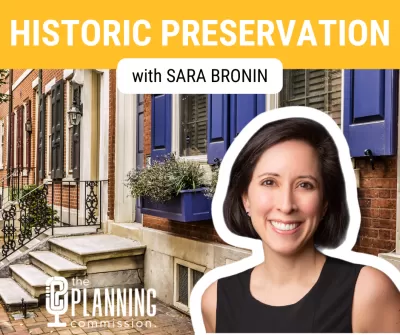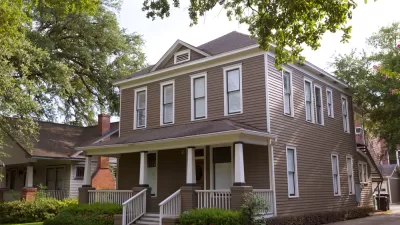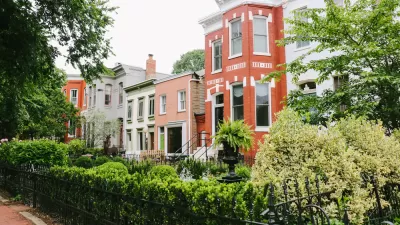Sara Bronin was recently appointed by President Biden to chair the ACHP. In this episode she takes us back to the future on what historic preservation means to American cities and what planners can do to balance preservation with contemporary needs.

We all love historic Main Streets and what they mean to a community. The desire to preserve the feel of such places is at the root of many local historic preservation efforts. The upper floors of those Main Street buildings are also part of that Main Street’s history, with many built as housing that has since been zoned out as a permitted use.
That’s where historic preservation, planning, and affordable housing can come together to address community needs while honoring our history, according to Advisory Council on Historic Preservation (ACHP) Chair Sara Bronin.
Bronin views preservation and community goals like housing affordability as endeavors that go hand-in-hand. “Preservation looks at the exterior of the building, while zoning looks primarily at the uses inside the building,” Bronin told The Planning Commission Podcast. “If we allow people to convert existing buildings into two-unit, three-unit, four-unit or multi-unit dwellings, that’s something that could help. If we’re locking the outside in stone, we don’t have to lock the inside in stone.”
Bronin discusses efforts beyond Main Street to help address housing needs, such as converting historic mill properties in Connecticut and elsewhere into housing and office space. “Those are often zoned for industrial developments only.”
As ACHP’s leader, Bronin addresses how the agency is adapting its definition of historic preservation. While the preservation movement in the United States was founded on desires to protect the properties of the Founding Fathers, it has evolved with the country to incorporate full neighborhoods, places of historical significance for women and diverse cultures. ACHP is now examining traditional cultural properties and how to adapt to climate change.
“One of the hot topics at fed level is how do we know something is significant?,” said Bronin. “Do we rely only on textbooks and people with doctoral degrees or do we actually rely on people with lived experience and knowledge about their communities.”
The Planning Commission is a spirited debate by planners, for planners. This independent outlet for all things planning explores the serious and lighter sides of the profession, poses probing and creative questions to guests, and always pairs the episode guest and topic with a choice libation. Listen to the podcast for a special offer from Planetizen.

Planetizen Federal Action Tracker
A weekly monitor of how Trump’s orders and actions are impacting planners and planning in America.

Congressman Proposes Bill to Rename DC Metro “Trump Train”
The Make Autorail Great Again Act would withhold federal funding to the system until the Washington Metropolitan Area Transit Authority (WMATA), rebrands as the Washington Metropolitan Authority for Greater Access (WMAGA).

DARTSpace Platform Streamlines Dallas TOD Application Process
The Dallas transit agency hopes a shorter permitting timeline will boost transit-oriented development around rail stations.

LA County Creating Action Plan to Tackle Extreme Heat
Los Angeles County is creating a Heat Action Plan to help communities stay safe during extreme heat, with steps like adding more shade, improving buildings, and supporting the neighborhoods most at risk.

Maryland Plans Quick-Build Complete Streets Projects
The state will use low-cost interventions to improve road safety in five Maryland counties.

Downtown Los Angeles Gears Up for Growth
A new report highlights Downtown L.A.’s ongoing revival through major housing projects, adaptive reuse, hospitality growth, and preparations for global events in the years ahead.
Urban Design for Planners 1: Software Tools
This six-course series explores essential urban design concepts using open source software and equips planners with the tools they need to participate fully in the urban design process.
Planning for Universal Design
Learn the tools for implementing Universal Design in planning regulations.
City of Charlotte
Municipality of Princeton
Roanoke Valley-Alleghany Regional Commission
City of Camden Redevelopment Agency
City of Astoria
Transportation Research & Education Center (TREC) at Portland State University
US High Speed Rail Association
City of Camden Redevelopment Agency
Municipality of Princeton (NJ)





























